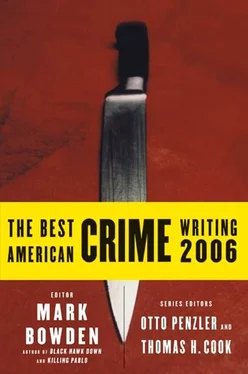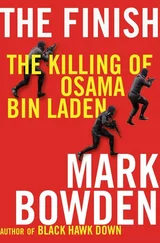On some level, Lessig realized that the relationship was "fucked up and shouldn't happen," he says. But he also had a precocious fourteen-year-old's exaggerated sense of his own maturity. "I felt that I could handle it," he says. "That everything was under control."
There were moments, however, when reality came crashing through. In Lessig's final year, he found himself gripped by "an insane depression," he says, over "the insanity of what was happening." In his closet he'd found a hatch in the ceiling that led to a crawl space above. He climbed up there and crouched alone for hours in the dark.
One evening near the end of Lessig's final year at the school, he went with Hanson for a walk around the grounds. As darkness descended on Albemarle, Lessig finally, tentatively, gave voice to his gathering misgivings about Hanson's behavior.
"Is this really right? Should you really be doing this?" Lessig asked.
"You have to understand," Hanson replied, "this is essential to producing a great boychoir." By sexualizing the students, he explained, he was transforming them from innocents into more complicated creatures, enabling them to render choral music in all its sublime passion."It's what all great boychoirs do," Hanson said.
After Lessig moved back to Williamsport for high school, he brooded on what had happened in Princeton. Two years later, he contacted the boychoir's headmaster, Stephen Howard, and persuaded Howard to appoint him as the alumni representative to the board of directors. Then Lessig went and told Don Hanson that what he was doing was wrong-wrong for the kids, wrong for the school, even wrong for Hanson.
"It's harmful, it's destructive, you'll get caught, you'll get hanged," Lessig said. "It's really got to stop."
Hanson didn't argue. Instead, he told Lessig that he had a boyfriend now, a former student who'd left the school with whom he was carrying on. All of his needs were being met.
Lessig wasn't satisfied. "You should recognize that I'm now on the board," he said. "If it doesn't stop, I'm going to out you."
"You're right," Hanson said. "Absolutely, I promise, it will never happen again."
Lessig believed Hanson utterly. He had yet to learn that pedophilia is an illness, an all-consuming compulsion. At seventeen, he was flush with the sense of his power to defuse such a delicate situation. "I knew all these things that nobody else did," he recalls. "I was keeping the institution together. I really wanted it to succeed. And the picture of the institution succeeding with Hanson continuing as choir director was really what I thought should happen."
But in the fall of 1981 Lessig got a call from Stephen Howard: Hanson had been accused of molesting two students. Lessig by then was an undergrad at the University of Pennsylvania, studying economics and management with an eye to following his father's path and going into business. Lessig drove up to Princeton for an emergency board meeting, where he learned that Hanson had tried to kill himself by putting his head inside a gas oven. Lessig thereupon told Howard everything he knew about Hanson's history of abuse.
In March 1982 Howard sent a letter to the school's parents, informing them that Hanson had resigned "for reasons of personal health." Without mentioning the scandal, the letter lauded Hanson for his service: "He alone held the school together in the early seventies… hiring and firing staff, running the admissions and concert offices, from time to time driving the bus and even washing the dishes…His story at the Boychoir School is one of total devotion to the boys and dedication to the best interests of the School."
After his dismissal, Hanson retreated to Canada, while Lessig gave up his seat on the board and got on with his life. His academic brilliance now unfurling in earnest, he went to Trinity College, Cambridge, where he studied philosophy for three years before entering law school. For a time, his attitude to what Hanson had done, he says, was,"No harm, no foul."
Then, at Yale Law School, Lessig took a course taught by arch-feminist Catharine MacKinnon and began to ponder his relationship with Hanson in a different, more sophisticated light. "There was this moment when I realized that I had been, in the traditional way, a woman in all relevant respects-totally passive, an object of sexual aggression," he says. "I'd adopted this supportive, protective role with respect to him." Among his many other afflictions, Hanson was an alcoholic. "There was this one time I literally saved his life," Lessig recalls. "I came into his bedroom and he was passed out, vomiting, and I had to flip him over to stop him from suffocating. And this, I felt, was my role. I was his wife."
Lessig had been involved with a number of women in college and graduate school. And he began to see self-destructive patterns in his relationships. "I remember throwing tantrums," he says,"as I recognized how this thing had intruded in my life."
After landing a plum professorship at the University of Chicago Law School, Lessig entered therapy. "The therapist was really great," he observes with an ironic chuckle. "He said, 'This is very significant, but you're lucky-at least you didn't become a homosexual.' "
What happened next is something Lessig refuses to discuss. But according to Hardwicke's lead attorney, Keith Smith, Lessig sued the Boychoir School and received a settlement. Both the suit and the settlement are officially under seal, with a confidentiality agreement that bars either side from disclosing their existence, let alone any of the details. What Lessig can say, however, is that the school and its lawyers are aware of his abuse by Hanson. And that, in his interactions with them before the Hardwicke case, he thinks that "they behaved well."
In the next decade, Lessig had almost zero contact with the school, as his legal career went supernova and his personal life settled happily. From Chicago, he moved on first to Harvard Law School and then to Stanford. He married, had a son, and set up digs in a rambling Spanish house not far from the ocean in San Francisco. Soaking in the hot tub on his balcony at night, watching the fog creep in, Lessig believed, with good reason, that he had put the Boychoir School behind him.
And then one day in 2001 came the e-mail from John Hardwicke.
The distance from Lessig's to Hardwicke's house is vast in every sense. In deepest rural Maryland, not far from the Pennsylvania line, it's a small Cape Codder with rickety shutters and a mudslick for a driveway. On the day I visit, in February, the front walk is covered with snow; horses graze in a pasture next door. Inside, John and his wife,Terri, pad around in stocking feet, smoking Marlboro Medium 100s one after another. There are stuffed toys strewn around the house-Terri's creations. In the living room, a court jester sits amid a metric ton of brick-a-brac, next to a full-size harp.
After a while, the Hardwickes' fifteen-year-old daughter bounces through the door in a pair of pink Chuck Taylor high-tops. Her father worries about her taste in music-the Velvet Underground-and the fact that she has a steady boyfriend. "When I hear her listening to 'Heroin,' well, I don't know," Hardwicke says. "There's only two things that can ruin your life: drugs and sex."
Hardwicke pours a cup of coffee and sits with his legs tucked underneath him on the floor of the TV room. At forty-seven, he is tall and thin, with pale-pink skin, a snow-white beard, and watery blue eyes. He begins by telling me about the first time he discussed his abuse with a reporter. "I felt this incredible evil hovering around me that I just knew was going to kill me," he says. "And then this evil communicated, 'No, it's not you, it's your wife.We're going to start with her.' "
If the effects of Lessig's abuse were subtle and slow to emerge, for Hardwicke they're glaring and have plagued him relentlessly throughout his life. After he met Terri at Catholic University, they were married and started a business together doing freelance PR, graphic design, brochures, and such. But Hardwicke, who was told repeatedly by Hanson that he was gay, has struggled for many years with confusion over his sexual orientation.Well into his marriage, he found himself engaging in anonymous trysts with men.
Читать дальше












